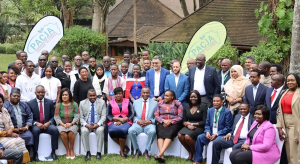The Pan-African Parliamentary Dialogue convenes in Nairobi, Kenya to mobilise and align the efforts of African legislatures and parliamentarians around the resolutions and recommendations on climate justice and equity to influence the global climate agenda for a sustainable future for Africa and the world.

The meeting, holding from August 31 to September 1, 2023, at the instance of the Pan-African Parliament and Pan-African Climate Justice Alliance (PACJA), intends to use the presence of African parliamentarians in Nairobi during the Africa Climate Week to facilitate reflections and assert the prominence and visibility of African parliamentarians within the global climate change discourse.
The ongoing Parliamentary dialogue takes place on the sidelines of Africa Climate Summit 2023 scheduled to take place in Nairobi, Kenya, from September 3 to 8, under the theme: “Driving green climate Finance solutions for Africa and the world”. For two days, Parliamentarians from across the continent are discussing ways to give effects to the Pan-African Parliament’s Resolutions and Recommendations on Climate Policy and Equity in Africa and develop the framework for the Model Law on Climate Change.
The Pan-African Parliamentary Dialogue follows the third Pan-African Climate Summit on Equity held in Midrand, South Africa. In this consultation, African legislatures developed recommendations and resolutions that target actions at the global level with the focus on operationalising the global goal of adaptation, pushing developed countries to honour their commitments, and sustaining pressure on developed countries to take urgent actions in cutting their emissions among others.
Martha Wangari, on behalf of the Speaker of the National Parliament of Kenya, Dr. Moses Wetangula, said that Africa has been facing the impacts of climate change and that this is the time for everyone to understand that its impacts are not selective.
“Climate change does not discriminate; it affects all of us. Yet, its impacts disproportionately burden those who have contributed the least to its causes. Equity means that those who can do more must shoulder the burden of responsibility for the sake of those who have less. As was highlighted during the Third PanAfrican Parliamentarians Summit on Climate Policy and Equity this year, Africa is the least polluter but the most affected by the climate crisis,” added Wangari.
In the same spirit, the message of the Speaker of the Senate of Kenya, Amason Jeffah Kingi, to the participants of the dialogue, affirmed that the event is another critical platform for adding impetus to ongoing initiatives to find solutions to issues affecting Africa from a parliamentary perspective.
“This state of affairs must change. Africa must be at the heart of every global engagement and undertaking that has a bearing on its interests and the interests of its people. And it starts with the leadership in the continent appreciating our cumulative and determining to persistently leverage the same to advance African interests in all spheres of engagements including on Climate Change and climate action,” stressed Kingi.
Senator John Bonds Bideri, the Chair of the Pan-African Parliament Permanent Committee on Trade, Customs, and Immigration Matters, said that the parliament was created to promote popular participation and representation of African peoples in decision-making, good governance, oversight, accountability and transparency. He said that the dialogue is an opportunity to concretise the resolutions made in South Africa.
“I do not doubt that, through this forum, we as Parliamentarians will be equipped with the necessary knowledge and skill sets to add impetus to previous climate action efforts, as well as to the African voice on the global climate agenda,” affirmed Bideri.
In May 2023, the Pan-African Members of Parliament sat for the Third Summit where they drew recommendations and resolutions in line with the promotion of climate policy and equity in African and the global arena. Speaking to participants, Dr Mithika Mwenda, the Executive Director of PACJA, urged that all climate policies and actions should be well aligned with development priorities and aspirations as articulated in Agenda 2063 and Sustainable Development Goals.
Dr. Mwenda added: “We must pursue low-carbon development pathways that enhance our energy, food, water, and health security while protecting our natural resources and biodiversity. We must empower our communities, especially women and youth, to participate in decision-making and implementing climate solutions at all levels.”
Among the key outcomes of the Third Pan-African Parliamentary Summit included the adoption of the resolutions that mandated the Pan-African Parliament house to develop a model law on climate change, which is seen an important step in strengthening the continent’s response to the climate change challenge.
